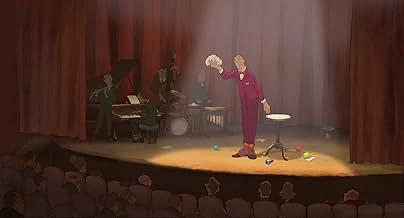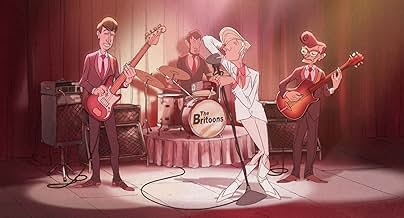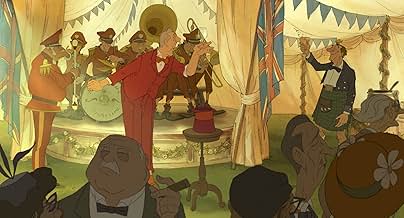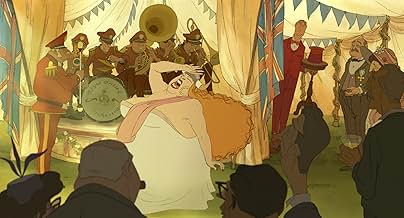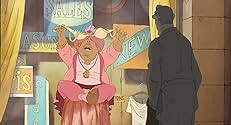A French illusionist finds himself out of work and travels to Scotland, where he meets a young woman. Their ensuing adventure changes both their lives forever.A French illusionist finds himself out of work and travels to Scotland, where he meets a young woman. Their ensuing adventure changes both their lives forever.A French illusionist finds himself out of work and travels to Scotland, where he meets a young woman. Their ensuing adventure changes both their lives forever.
- Director
- Writers
- Stars
- Nominated for 1 Oscar
- 7 wins & 35 nominations total
Jean-Claude Donda
- The Illusionist
- (voice)
- …
Eilidh Rankin
- Alice
- (voice)
Tom Urie
- Additional Voices
- (voice)
Paul Bandey
- Additional Voices
- (voice)
Jacques Tati
- Monsieur Hulot
- (archive footage)
- (uncredited)
- Director
- Writers
- All cast & crew
- Production, box office & more at IMDbPro
Featured reviews
When I went to go see this film at the Edinburgh Film Festival there was a big buzz surrounding it. People were enthralled that a movie would focus so much on the city, but did it do Edinburgh justice?
A few minutes into the movie Edinburgh comes into picture. Set in the 1950's we see a quiet and very quaint Edinburgh. It features heavily on many of the monuments still present today and I love the way we see the architecture unaffected by modern builds. It made me wish I lived back then. The 3D shot that encapsulates all of Edinburgh in one go, is mind-blowing.
However, as much as I loved seeing Edinburgh in the wonderful rich colours of detail, I was disappointed by the rather gloomy feel to the movie. Yes, it has its charming moments, especially with the merry, drunk Scotsman character, but much of the side plots and main plots I feel are a tad melancholy which in turn, sobered my experience of the film.
The little dialogue (mainly in French and Gaelic; I don't understand either) is pretty easy to follow, but during the end of the film I was left cold when I misunderstood small phrases. It did frustrate me a little, but it led me to interpret the film differently, giving an ambiguous feel to an overall very charming and impressive piece of animation.
A few minutes into the movie Edinburgh comes into picture. Set in the 1950's we see a quiet and very quaint Edinburgh. It features heavily on many of the monuments still present today and I love the way we see the architecture unaffected by modern builds. It made me wish I lived back then. The 3D shot that encapsulates all of Edinburgh in one go, is mind-blowing.
However, as much as I loved seeing Edinburgh in the wonderful rich colours of detail, I was disappointed by the rather gloomy feel to the movie. Yes, it has its charming moments, especially with the merry, drunk Scotsman character, but much of the side plots and main plots I feel are a tad melancholy which in turn, sobered my experience of the film.
The little dialogue (mainly in French and Gaelic; I don't understand either) is pretty easy to follow, but during the end of the film I was left cold when I misunderstood small phrases. It did frustrate me a little, but it led me to interpret the film differently, giving an ambiguous feel to an overall very charming and impressive piece of animation.
Simplicity is a very interesting word that is defined in many ways. "The Illusionist" is a film that is synonymous with this word and is a visual representation of the art of simplicity. Nominated for every major best Animated Feature Film award including a 2011 Oscar Nomination birth, "The Illusionist" is more than just one of the best-animated films of the year. Will it win the Oscar for Best Animated Feature Film? Probably not just because "Toy Story 3" went on a record breaking spree within the animation genre, however, "The Illusionist" is just as good as "Toy Story 3" if not a little better. The film is based off of a script written in the late 1950s by a French, mime, actor, and director named Jacques Tati, but was forgotten about until Director Syvain Chomet picked up the script and ran with it producing an 80 minute animated masterpiece. The film follows the travels of a French Illusionist from town to town looking for work while performing his artistic magician craft in small shows. However, his profession is lost within the changing entertainment era causing him to lose hope, until one day while traveling in Scotland he met a young girl named Alice. Alice changes his life with her belief that he is actually a real magician seeing through the illusion of magic and personifying it into being. The Illusionist becomes a father or grandfather figure to her as they grow together down very separate paths.
The simplicity of the film goes hand in hand with the authenticity and depth of the very easy to watch story. The animation is 2D brilliance with every image on the screen having deeper meaning of some sort. The film uses its filmatic space avoiding lulls and capturing the viewer's attention with its very short run time. This is achieved by the craft of Director Chomet who has created a picture that is so well done it does not even feel like its animated. This can be attributed to cinematography used with the animation. A camera seems as if it is filming the film almost as an alternative reality in a medium that would not of been as effective if it had not been animated. Authenticity is evident even with the minimal dialogue acting a throwback to a simpler era; silent film. It does not rely on its dialogue at all spreading it few and far between, however, when there is dialogue it is true to the setting and the nature of the film. It is in French and guess what? There aren't any annoying subtitles.
For some viewers the fact that the film is in French and that there aren't subtitles (I bet the DVD/Blu-Ray will have the option) it may be very frustrating. Also, this is not necessarily a kids movie. Kids will enjoy the magic behind "The Illusionist", but will not appreciate it as much as adults because of the immense amount of symbolism in the film.
Contemporary film seems to be all about glamor, special effects, and money leading to the creation of hit or miss films. However, film as an art is much simpler than that, which is a metaphor that resonates within the must see film "The Illusionist". Remember simplicity, simplicity, simplicity.
The simplicity of the film goes hand in hand with the authenticity and depth of the very easy to watch story. The animation is 2D brilliance with every image on the screen having deeper meaning of some sort. The film uses its filmatic space avoiding lulls and capturing the viewer's attention with its very short run time. This is achieved by the craft of Director Chomet who has created a picture that is so well done it does not even feel like its animated. This can be attributed to cinematography used with the animation. A camera seems as if it is filming the film almost as an alternative reality in a medium that would not of been as effective if it had not been animated. Authenticity is evident even with the minimal dialogue acting a throwback to a simpler era; silent film. It does not rely on its dialogue at all spreading it few and far between, however, when there is dialogue it is true to the setting and the nature of the film. It is in French and guess what? There aren't any annoying subtitles.
For some viewers the fact that the film is in French and that there aren't subtitles (I bet the DVD/Blu-Ray will have the option) it may be very frustrating. Also, this is not necessarily a kids movie. Kids will enjoy the magic behind "The Illusionist", but will not appreciate it as much as adults because of the immense amount of symbolism in the film.
Contemporary film seems to be all about glamor, special effects, and money leading to the creation of hit or miss films. However, film as an art is much simpler than that, which is a metaphor that resonates within the must see film "The Illusionist". Remember simplicity, simplicity, simplicity.
10zetes
Sylvain Chomet's long-awaited follow-up to The Triplets of Belleville adapts an unfilmed screenplay by French master Jacques Tati. Chomet's film doesn't feel much like a Tati film, though - it's very much a Chomet film. But that's okay. I wouldn't want some poor director to feel he has to ape another filmmaker's style. The Illusionist follows a vaudeville magician, modelled after Tati (and called Tatischeff, which was Tati's real last name). He's old, and his world is starting to fade. He leaves France for an extended tour of Britain. Eventually he finds his way to a remote Scottish island, where he meets up with a young woman, Alice. When Tatischeff leaves the island, the girl coyly follows him, and he pretty much adopts her. The two go to Edinburgh (or a fictionalized, Edinburgh-like city) and Tatischeff gets a regular job at a theater (and another at a gas station, secretly, at night) so he can provide the girl with the beautiful clothes she desires (having existed in squalor on the island, she has never seen dresses as beautiful as she does in the city).
The biggest resemblance that it bears to Tati's films, besides the Tati caricature at its center, is the fleeting, impossible romance between the man and the girl. All four of the M. Hulot films contain this element to one degree or another. In The Illusionist, the relationship falls somewhere between the analogous romances in M. Hulot's Holiday and Mon Oncle. In Mon Oncle, there is a teenage girl who has a crush on M. Hulot, but he knows he's far too old for her and treats her in an avuncular fashion. In M. Hulot's Holiday, he is quite a bit older than the blonde, who is frequently bothered by boys her own age, but at least he has a chance. In The Illusionist, Tatischeff is an old man. He does love the girl. He can keep her, but can never have her. She essentially isn't any different than his rabbit - living its life in a cage. When it's free, it's only going to bite his finger when he gets too close.
The film does not contain much in the way of the grotesque oddities that fueled The Triplets of Belleville. It is much subtler, gentler, and more beautiful. It has a grace all its own. It can be very funny when it wishes. Chomet has obviously spent years on this film, and it looks spectacular. Even if he had made only The Triplets of Belleville, his reputation amongst cinematic animators would be secure, but The Illusionist puts him very near the top of the list of the greatest who ever lived.
The biggest resemblance that it bears to Tati's films, besides the Tati caricature at its center, is the fleeting, impossible romance between the man and the girl. All four of the M. Hulot films contain this element to one degree or another. In The Illusionist, the relationship falls somewhere between the analogous romances in M. Hulot's Holiday and Mon Oncle. In Mon Oncle, there is a teenage girl who has a crush on M. Hulot, but he knows he's far too old for her and treats her in an avuncular fashion. In M. Hulot's Holiday, he is quite a bit older than the blonde, who is frequently bothered by boys her own age, but at least he has a chance. In The Illusionist, Tatischeff is an old man. He does love the girl. He can keep her, but can never have her. She essentially isn't any different than his rabbit - living its life in a cage. When it's free, it's only going to bite his finger when he gets too close.
The film does not contain much in the way of the grotesque oddities that fueled The Triplets of Belleville. It is much subtler, gentler, and more beautiful. It has a grace all its own. It can be very funny when it wishes. Chomet has obviously spent years on this film, and it looks spectacular. Even if he had made only The Triplets of Belleville, his reputation amongst cinematic animators would be secure, but The Illusionist puts him very near the top of the list of the greatest who ever lived.
Based on an unpublished script by Jacques Tati, The Illusionist follows a magician named Tatischeff, a man whose art form of illusion is dying. He begins taking any job that comes along his way, and even while in Scotland, is accompanied by a young girl named Alice. Tatischeff and Alice develop a sort of father/daughter bond, and Tatischeff ponders his own life as well.
The film is directed by Sylvain Chomet, the man probably best known for his 2003 animated art-house feature The Triplets of Belleville. One thing that I simply adore about The Illusionist is that Chomet follows closely to the phrase "Actions speak louder than words." The film's dialogue is minimal, and for it's storytelling relies almost entirely on animation, body language, and a simple, but beautiful musical score written by Chomet himself.
This isn't even mentioning the animation style itself. I've seen many 2010 movies, but The Illusionist is easily the most gorgeous. The characters are given fluid and realistic movements, and the ambient surroundings of the city and hillsides are outstanding examples of art-direction. I practically had to suppress the tears (And no, I'm not kidding).
You may find a movie you like better than The Illusionist, but frankly, I don't think you'll be able to find a SINGLE. DAMN. MOVIE. more beautiful than this one.
I give it ***1/2 out of ****
The film is directed by Sylvain Chomet, the man probably best known for his 2003 animated art-house feature The Triplets of Belleville. One thing that I simply adore about The Illusionist is that Chomet follows closely to the phrase "Actions speak louder than words." The film's dialogue is minimal, and for it's storytelling relies almost entirely on animation, body language, and a simple, but beautiful musical score written by Chomet himself.
This isn't even mentioning the animation style itself. I've seen many 2010 movies, but The Illusionist is easily the most gorgeous. The characters are given fluid and realistic movements, and the ambient surroundings of the city and hillsides are outstanding examples of art-direction. I practically had to suppress the tears (And no, I'm not kidding).
You may find a movie you like better than The Illusionist, but frankly, I don't think you'll be able to find a SINGLE. DAMN. MOVIE. more beautiful than this one.
I give it ***1/2 out of ****
It was my great privilege to be invited to the world premiere of Sylvain Chomet's follow up to Belleville Rendez-Vous.
Set in Edinburgh and produced by an old pal of mine, Bob Last, I had very high expectations indeed. Not least because it is not every day that one of the world's most beautiful cities (my own) would be caught in artful majesty for years to come. And indeed it was. Edinburgh is a real star of this charming but very slight movie.
The city shimmers throughout, but the story sadly does not. It reminded me of a novel by Irish writer, William Trevor, called Felicia's Journey in which a young girl is taken into the trust of an older man. In that book (and subsequent film starring Bob Hoskins) and this, there is a slight air of seediness. (That's maybe going too far in the case of The Illusionist but the comparison was palpable for me.) Why the protection? What are the man's motives? I found it mildly uncomfortable. The fact is, in neither case are the intentions, apparently, anything more than protective; but somehow the feeling persists in both that all may not be as it seems.
Belleville Rendez-Vous arrived on the film scene like a bolt from the blue. This, sadly, suffers from that difficult second film syndrome. It oozes class and charm from every pore. It looks sublime. But the story (a Jaques Tati cast off) fails to deliver. It simply does not have the muscle to sustain 90 minutes of screen time.
A real shame because it has a great deal of merit.
Heart? 8/10.
Head? 6/10
Set in Edinburgh and produced by an old pal of mine, Bob Last, I had very high expectations indeed. Not least because it is not every day that one of the world's most beautiful cities (my own) would be caught in artful majesty for years to come. And indeed it was. Edinburgh is a real star of this charming but very slight movie.
The city shimmers throughout, but the story sadly does not. It reminded me of a novel by Irish writer, William Trevor, called Felicia's Journey in which a young girl is taken into the trust of an older man. In that book (and subsequent film starring Bob Hoskins) and this, there is a slight air of seediness. (That's maybe going too far in the case of The Illusionist but the comparison was palpable for me.) Why the protection? What are the man's motives? I found it mildly uncomfortable. The fact is, in neither case are the intentions, apparently, anything more than protective; but somehow the feeling persists in both that all may not be as it seems.
Belleville Rendez-Vous arrived on the film scene like a bolt from the blue. This, sadly, suffers from that difficult second film syndrome. It oozes class and charm from every pore. It looks sublime. But the story (a Jaques Tati cast off) fails to deliver. It simply does not have the muscle to sustain 90 minutes of screen time.
A real shame because it has a great deal of merit.
Heart? 8/10.
Head? 6/10
Did you know
- TriviaWhen the Illusionist is performing at the Scottish pub, one of the patrons in the foreground, near the middle of the frame, is the famous "Young Girl and Old Woman" optical illusion.
- GoofsDespite being set in 1959/1960, the Scottish Police motorcycles have 'American-style' sirens, which were not introduced until the 1980s.
- Crazy creditsAt the end of the final credits, there's a short bonus scene.
- SoundtracksMy Girl Blue
Written & Composed by Malcolm Ross
Published by Django Films Ltd
Performed by Malcolm Ross, Iain Stoddart (as Ian Stoddart), and Leo Condie aka - "The Britoons"
- How long is The Illusionist?Powered by Alexa
Details
- Release date
- Countries of origin
- Official site
- Languages
- Also known as
- Ілюзіоніст
- Filming locations
- Edinburgh, Scotland, UK(Studio)
- Production companies
- See more company credits at IMDbPro
Box office
- Budget
- $17,000,000 (estimated)
- Gross US & Canada
- $2,231,474
- Opening weekend US & Canada
- $38,594
- Dec 26, 2010
- Gross worldwide
- $6,007,194
- Runtime
- 1h 20m(80 min)
- Color
- Sound mix
- Aspect ratio
- 1.85 : 1
Contribute to this page
Suggest an edit or add missing content







